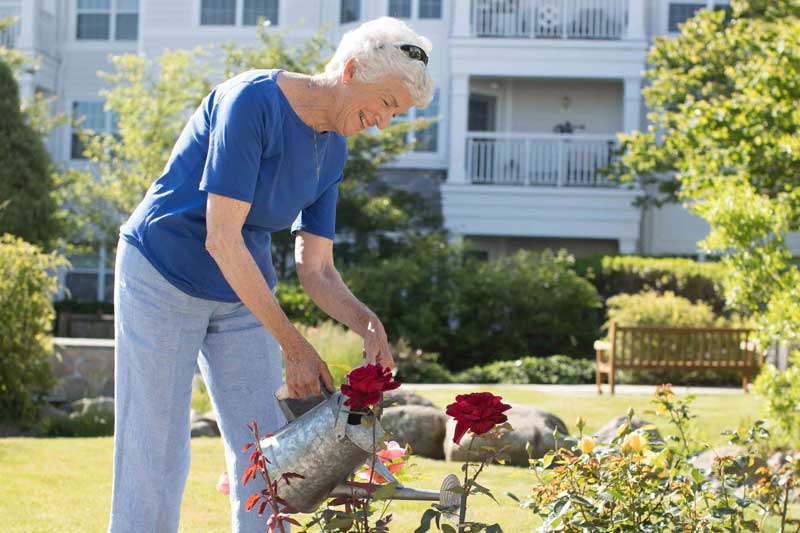
Contact
How Gardening Helps Keep Your Health in Full Bloom
Gardeners in Connecticut anticipate spring like sprinters preparing to burst out of their blocks. We can’t wait to shake off the dead of winter and start mucking about in the soil. But there’s more to the start of gardening season than getting back to nature.
Gardening for seniors offers a host of life-enhancing benefits. Here’s just a handful of the many health benefits of gardening we’ve dug up for you.
1. Gain a Sunny Disposition
Getting your hands dirty in the garden can increase your serotonin levels. Serotonin is a natural antidepressant. It’s triggered in your brain when a friendly bacteria in the soil called Mycobacterium vaccae comes in contact with your skin.
Another happy brain chemical triggered by gardening is dopamine. When we harvest fruits and vegetables, the sight, smell, and act of plucking them stimulates the release of dopamine. It’s that sense of joy you feel seeing the first tender asparagus shoot of spring or reaching for a plump red strawberry fresh from the patch.
2. Lower Stress Levels
A Dutch study showed that just 30 minutes of gardening reduces cortisol levels. Cortisol is the primary stress hormone. Elevated cortisol levels interfere with learning and memory, lower immune function and bone density, increase weight gain, blood pressure, cholesterol and heart disease. So if life’s getting you down, or you’re just feeling a bit antsy, get out in the garden. Take care of your plants and they’ll take care of you.
3. Make Your Heart Healthy
Regular gardening for seniors can cut the risk of heart attack or stroke by up to 30%, according to a study of almost 4,000 60-year-olds in Stockholm. If you’re a gardener, you know that “regular gardening” comes with the territory. There are plants to water, weeds to pull, and branches to prune. Not to mention flowers to cut to brighten your home. Putting the time in isn’t a problem. For people with a passion for gardening, it’s an investment in their health and happiness.
Being outside also increases vitamin D levels, which has been shown to reduce the risk of heart disease and osteoporosis. It’s one more reason to get out and enjoy the health benefits of gardening.
4. Improve Strength and Mobility
If you’d rather be in the garden than the gym, here’s some good news. A study conducted by the American Society for Horticultural Science found that 30 minutes of gardening fulfills all physical activity recommendations for seniors. All that squatting, digging, and lifting helps keep you limber and strong.
But if your knees creak and your back aches when kneeling or bending over, consider a raised garden bed or trellis so you don’t have to stoop as often. Gardeners at StoneRidge have access to raised beds in our community garden. Lightweight tools or those with soft-grip handles also make gardening easy for seniors.
5. Boost Your Immune System
Our old friend Mycobacterium vaccae, the bacteria found in garden soil, can improve your immune system. In addition to helping you fight off colds and flu, this bacteria has been known to alleviate symptoms of allergies, asthma and psoriasis. It helps if the garden soil you’re digging in is rich in organic matter. Chemical fertilizers, fungicides, herbicides and pesticides are devastating to friendly soil bacteria.
Outdoor activities like gardening also expose you to sunshine. Exposure to sunlight increases vitamin D levels, which benefits your immune system (as well as your skeletal system). Just be sure to put on sunscreen and a hat to protect your skin from overexposure to UV rays.
6. Reduce the Risk of Dementia
A study in Australia found that gardening could reduce the risk of dementia by 36%. Researchers tracked more than 2,800 people over the age of 60 for 16 years, and concluded that daily gardening could help keep your mind sharp.
Cultivate a Vibrant Lifestyle
The Perennials, our resident garden club, help keep our beautiful campus blooming with color. But they’re just one group of many pursuing their passion and doing what brings them joy and fulfillment. From painting and woodworking to poetry and song, you’ll find a wealth of activities to enrich your life at StoneRidge.
To learn more about our vibrant Life Plan Community, including floor plans and health services, visit our Independent Living page.





